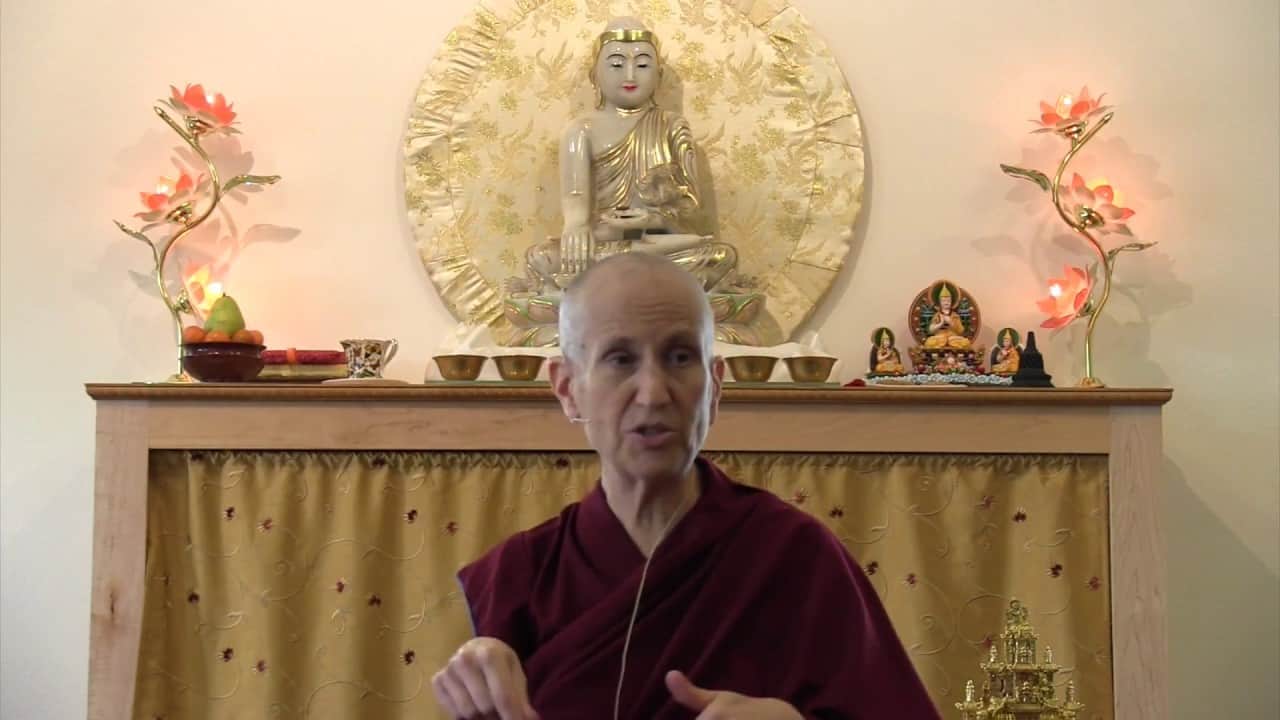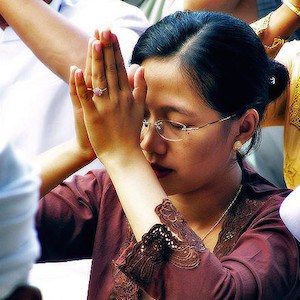Offering our bodies to sentient beings
The text turns to training the mind on the stages of the path of advanced level practitioners. Part of a series of teachings on the Gomchen Lamrim by Gomchen Ngawang Drakpa. Visit Gomchen Lamrim Study Guide for a full list of contemplation points for the series.
- Where is the “I” in the decision-making process
- Taking on the suffering of our past or future self and other beings
- Different ways of mentally giving our bodies to others
- Offering worldly happiness and Dharma realizations
- How to relate to people who don’t like us
Gomchen Lamrim 80: Offering our bodies to sentient beings (download)
Contemplation points
While doing the “taking and giving” meditation below, consider some of the points Venerable Chodron taught this week:
- Consider the “poor quality view” that Venerable Chodron presented at the beginning of the teaching. What kinds of thoughts have arisen in your own mind that demonstrate a lack of self-confidence? How have these thoughts been an impediment to your practice in general? How are they an impediment to the taking and giving meditation specifically? What are steps you can take, antidotes you can apply, to counter feelings of inadequacy and cultivate self-confidence?
- Key to the giving part of the meditation is to tune in to what others need. Really put some time and thought into imagining what individual beings really need and then imagine them receiving it and being completely satiated. Do this not just for humans, but for beings in the other realms as well. What might they want and need? You can even use current events to help (giving green cards and freedom from fear to immigrants, etc).
- Remember that you start with giving them what they need in their present realm of existence, but don’t stop there. Give them a precious human life, teach them the Dharma through each of the stages of the lamrim, give them the realizations that ripen their mind so that they attain liberation and awakening. Seeing their profound peace and happiness, rejoice.
- Venerable mentioned four different ways of giving to others during the taking and giving meditation. Try each of these at some point during the week. Which do you most connect with?
- Your one body emanates what others need.
- Your body multiplies, going to each sentient being and becoming what each being needs.
- Your body becomes a wish fulfilling jewel which gives others what they need.
- Your body dissolves into the four elements which, when given to others, becomes the basis and support for their life and everything they need.
- Try the supplemental meditation on beings who wish you harm:
- Meditate on love, compassion, and the kindness of these beings, how they have been your mother, your best friend, your dear child, your protector again and again in many lives. Allow a feeling of wanting to repay their kindness to arise, despite their present form.
- “Hook” them, bringing them in front of you – beings from this and past lives – in the form of angry spirits and/or humans.
- Tell them how much you have appreciated their love and care and that you wish to repay that kindness. Give them the meat, blood, bones and skin from your own body. For others you can transform your body into sugar, molasses and honey.
- Imagine them completely free of their hostility, their minds transformed and peaceful. Imagine giving them a precious human life, teaching them the Dharma, and leading them to awakening…
- This meditation helps to habituate our mind with generosity. Take some time to imagine what it would be like to give without hesitation, without miserliness. What would it be like to have a heart that didn’t hold back, that knew exactly what others need and provided it freely? Cultivate a feeling in your heart that this is possible.
Taking and giving meditation
- Start with yourself.
- Imagine the dukkha you might experience tomorrow (dukkha of pain, dukkha of change, and the pervasive dukkha of conditioning).
- Once you have a feel for it, take it on your present self so that the person you are tomorrow doesn’t have to experience it. You can imagine the dukkha leaving your future self in the form of pollution or black light, or whatever is useful to you.
- As you take on the dukkha in the form of pollution/black light, imagine it strikes at the self-centeredness at your own heart, like a thunderbolt, completely demolishing it (self-centeredness can appear as a black lump or dirt, etc).
- Now think about your future self next month. You’re future self as an old person and do the same exercise…
- Then consider the dukkha of those you are close to using the same points as above.
- Next, consider the dukkha of those towards whom you feel neutral.
- Next, the dukkha of those you don’t like or trust.
- Finally, consider the dukkha of beings in all the different realms (hell, preta, animal, human, demi god, and god).
- Having destroyed your own self-centeredness, you have a nice open space at your heart. From there, with love, imagine transforming, multiplying, and giving your body, possessions, and merit to these beings. Imagine them being satisfied and happy. Think that they have all the circumstances conducive to attaining awakening. Rejoice that you’ve been able to bring this about.
- Conclusion: Feel you are strong enough to take on others’ dukkha and give them your happiness. Rejoice that you can imagine doing this, practice it as you notice and experience suffering in your daily life, and offer prayers of aspiration to be able to actually do this.
Venerable Thubten Chodron
Venerable Chodron emphasizes the practical application of Buddha’s teachings in our daily lives and is especially skilled at explaining them in ways easily understood and practiced by Westerners. She is well known for her warm, humorous, and lucid teachings. She was ordained as a Buddhist nun in 1977 by Kyabje Ling Rinpoche in Dharamsala, India, and in 1986 she received bhikshuni (full) ordination in Taiwan. Read her full bio.


